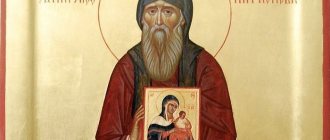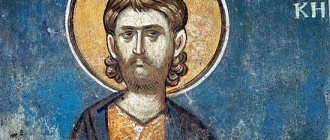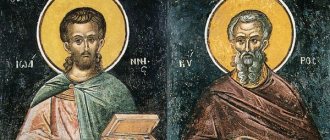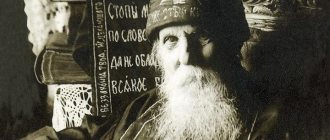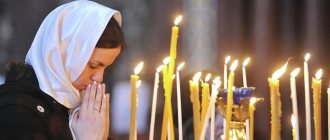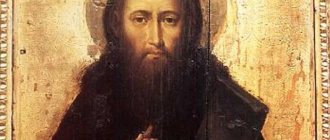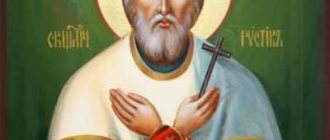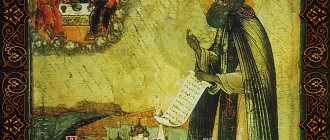| St. Kirill Belozersky, 16th century icon |
Kirill Belozersky
(+ 1427), abbot, venerable Commemoration on June 9, in the Cathedral of Moscow and in the Cathedral of Radonezh Saints
In the world, Cosma was born in Moscow to pious parents. In his youth, he was left an orphan and lived with his relative, boyar Timofey Vasilyevich Velyaminov, a circus at the court of Grand Duke Dimitri Donskoy.
Social life weighed heavily on the young man. At the request of the Monk Stefan of Makhrishchi (+ 1406), the boyar released Cosmas to the Simonov Monastery, where he took monastic vows from St. Theodore with the name Cyril.
The Monk Kirill performed his monastic obediences under the guidance of Elder Michael, later Bishop of Smolensk. At night, the elder read the Psalter, and St. Cyril bowed, but at the first strike of the bell he went to Matins. He asked the elder for permission to eat food after 2-3 days, but the experienced mentor did not allow this, but blessed him to eat every day with the brethren, but not to the point of satiety. The Monk Kirill carried out obedience in the bakery: he carried water, chopped wood, and distributed bread. When the Monk Sergius of Radonezh came to the Simonov monastery, he, first of all, visited and talked with love with the Monk Kirill. From the bakery, the Monk Cyril was transferred to the kitchen, and the saint said to himself, looking at the blazing fire: “See, Cyril, that you don’t end up in the eternal flame.” The Monk Kirill worked in the kitchen for nine years and acquired such tenderness that he could not eat bread without tears, thanking the Lord.
Avoiding human glory, the monk at times began to act like a fool. As punishment for violating decorum, the abbot prescribed bread and water as food for 40 days; St. Cyril joyfully bore this punishment. But no matter how much the saint hid his spirituality, the experienced elders understood him and against his will forced him to accept the rank of hieromonk. In his free time from serving, the Monk Kirill placed himself in the ranks of a novice and did hard work. When Saint Theodore was consecrated Archbishop of Rostov, the brethren in 1390 elected Saint Cyril as archimandrite of the monastery.
Rich and noble people began to visit the monk to listen to his instructions. This confused the saint’s humble spirit, and no matter how much the brethren begged him, he did not remain abbot, but secluded himself in his former cell. But here, too, frequent visitors disturbed the monk, and he moved to the old Simonovo. The soul of St. Cyril strove for silence, and he prayed to the Mother of God to show him a place useful for salvation. One night, while reading, as always, an akathist before the icon of the Mother of God Hodegetria, he heard a voice: “Go to Beloozero, there is a place for you.”
In the Beloezerskaya side, then remote and sparsely populated, he walked for a long time in search of the place that in the vision was intended for his stay. In the vicinity of Mount Myaury near Lake Siverskoye, he, together with his companion the Monk Ferapont, erected a cross and dug a dugout.
The Monk Ferapont soon retired to another place, and the Monk Cyril labored alone for many years in an underground cell. One day Saint Cyril, tormented by a strange dream, lay down to sleep under a pine tree, but as soon as he closed his eyes, he heard a voice: “Run, Cyril!” Only the Monk Kirill had time to jump away when the pine tree collapsed. The ascetic made a cross from this pine tree. Another time, the Monk Kirill almost died from flames and smoke when he was clearing the forest, but God protected His saint. One peasant tried to set fire to the monk’s cell, but no matter how hard he tried, he failed. Then, with tears of repentance, he confessed his sin to the Monk Cyril, who tonsured him into monasticism.
From the Simon's monastery the monks Zebedee and Dionysius, whom he loved, came to the monk, and then Nathanael, later the cellarer of the monastery. Many began to come to the monk and ask to be honored with monasticism. The holy elder realized that his time of silence was over. In 1397, he built a temple in honor of the Dormition of the Blessed Virgin Mary. This is how the Kirillo-Belozersky Monastery was founded.
When the number of brethren increased, the monk gave the monastery a community charter, which he illuminated with the example of his life. No one dared to talk in the church, no one was supposed to leave it before the end of the service; the Holy Gospel was approached according to seniority. Everyone sat down at their own place for the meal, and there was silence in the refectory. From the refectory everyone walked silently to his cell. No one could receive letters or gifts without showing them to St. Cyril; No letters were written without his blessing. The money was kept in the monastery treasury; no one had any property. They even went to the refectory to drink water. The cells were not locked, and they contained nothing except icons and books. In the last years of the life of the Monk Kirill, boyar Roman decided to donate the village to the monastery and sent a deed of gift. The Monk Kirill reasoned that if the monastery began to have villages, then the brethren would begin to worry about the land, settlers would appear, the monastic silence would be broken, and he refused the gift.
The Lord rewarded His saint with the gift of insight and healing. A certain Theodore, having entered the monastery out of love for the monk, then hated him so much that he could not look at the saint and tried to leave the monastery. He came to the cell of St. Cyril and, looking at his gray hair, could not utter a word out of shame. The monk told him: “Do not grieve, my brother, everyone is mistaken about me, you alone know the truth and all my unworthiness; I am truly an obscene sinner.” Then the Monk Cyril blessed Theodore and added that he would no longer be troubled by his thoughts; From then on, Theodore lived quietly in the monastery.
One day there was not enough wine for the Divine Liturgy, and the sexton told the saint about this. The Monk Kirill ordered an empty vessel to be brought to him, which turned out to be full of wine. During the famine, St. Cyril distributed bread to everyone in need, and it did not run out, despite the fact that usually the supplies were barely enough for the brethren.
The monk tamed the storm on the lake, which threatened the fishermen, predicted that none of the brethren would die before his death, despite the fact that the pestilence was raging, and after that many would follow him.
The monk performed his last service on the day of the Holy Trinity. Having bequeathed to the brethren to preserve love among themselves, the Monk Cyril rested blissfully in the 90th year of his life on June 9, 1427. In the very first year after the death of the monk, 30 of the 53 brethren died. To those who remained, the monk often appeared in dreams with support and guidance.
Reverend Kirill loved spiritual enlightenment and instilled this love in his students. According to the inventory of 1635, there were more than 2 thousand books in the monastery, among them 16 of “the wonderworker Cyril.” Remarkable examples of spiritual mentoring and guidance, love, peacefulness and consolation are the three letters of the saint to the Russian princes that have come down to us.
All-Russian veneration of the saint began no later than 1447-1448. The Life of St. Cyril was written on behalf of Metropolitan Theodosius and Grand Duke Vasily Vasilyevich by Hieromonk Pachomius Logofet, who arrived at the Kirillo-Belozersky Monastery in 1462 and found many eyewitnesses and disciples of St. Cyril, including St. Martinian, who then ruled the Ferapontov Monastery.
Life of Saint Cyril of Belozersky
The life of the saint dates back to the 14th century. It is not known for certain what family the righteous man came from. The lives tell us the worldly name of the saint - Kozma. In his early years he served the noble boyar Timofey Velyaminov. The desire for spiritual life had long fascinated Kozma, but Velyaminov did not want to let his faithful servant go to the monastery. The Monk Stefan Makhrishchesky managed to convince the boyar to give free rein to the future saint, who tonsured Cyril at the Simonov Monastery.
At the beginning of his monastic journey, the righteous man talked with the outstanding church fathers of that time - St. Sergius of Radonezh, Archbishop Fyodor of Rostov, Bishop Mikhail of Smolensk. Almost immediately, the monk’s ardent faith and his desire for strict asceticism appeared. When, in an attempt to humble the monk, the confessor imposed a punishment on him - strict fasting - Cyril was only happy.
Probably, through his asceticism the monk earned great authority among the brethren, therefore in 1388, at the age of 51, he became the abbot of the Simonov monastery. But Kirill quickly leaves his post and goes into voluntary seclusion. And after some time, he completely leaves his native monastery and, together with the Monk Ferapont, goes to Beloozero. It is believed that the indication for this journey was the appearance of the Most Pure Mother of God.
In 1397, he settled in a cave on the shore of Lake Siverskoye, where some time later the Kirillo-Belozersky Monastery appeared. The places here are harsh and wild, so Ferapont chose another place for his ministry. And Kirill began a period of testing. He found himself in dangerous situations many times - there were often fires, attacks by robbers, and once only a miracle saved the monk from a fallen tree.
Soon people in the area learned about the saint, and spiritual children flocked to him, wanting to share with him the burden of serving the Lord. A small brethren appeared. Kirill adopted a strict charter. Monks were forbidden to beg for alms, have any excesses in food or drink, or get carried away by idle thoughts. Strictness and asceticism were embodied even in the external decoration of the monastery.
The abbot was meek with his charges. Wisdom and calmness were also evident in relations with princes and boyars. Influential political figures understood the role of St. Cyril and sought to establish interaction with the illustrious archimandrite. The local nobility and successors of Dmitry Donskoy corresponded with him. The reasoning and exhortations of the righteous man influenced politics.
Thus, despite the desire for solitude, the monk became one of the most influential figures in the church. In addition, he was engaged in education: he collected a large library and wrote a lot himself. The saint died in 1427, leaving a rich spiritual heritage.
Venerable Kirill Beloezersky, abbot
Brief life of St. Kirill Beloezersky
In the world of Cosma.
Born in Moscow from pious parents. He accepted monasticism in the Simonov Monastery, with his exploits he earned the respect of all the brethren and was distinguished by the father of monks - St. Sergius. In 1390, the brethren of the Simonov monastery begged St. Cyril to be their abbot. The numerous and noble visitors who came to the abbot for instructions and blessings greatly embarrassed the Monk Cyril, who shunned human glory, and he soon resigned the rank of abbot and began to asceticize as a simple monk. Seeking complete solitude and silence, the Monk Kirill, at the miraculous direction of the Mother of God, retired to the shore of White Lake (Vologda region) and in a deep forest thicket began to lead the life of a hermit. Devotees of silence began to flock to him, and St. the elder realized that his time of silence was over. In 1397 he built a temple in honor of the Dormition of the Blessed Virgin Mary.
When the number of brethren increased, the monk gave the monastery a community charter, which he sanctified by the example of his life. In the church no one dared to talk, no one was supposed to leave it before the end of the service; they approached the Holy Gospel according to seniority. Everyone sat down at their own place for the meal, and there was silence in the refectory. From the refectory everyone walked silently to his cell. The money was kept in the monastery treasury; no one had any property. The cells were not locked, and they contained nothing except icons and books.
The Lord rewarded His saint with the gift of insight and healing. One day there was not enough wine for the Divine Liturgy, St. Cyril ordered an empty vessel to be brought to him, which turned out to be full of wine. During the famine, St. Cyril distributed bread to everyone in need, and it did not run out, despite the fact that usually the supplies were barely enough for the brethren. One day the monk calmed a storm on the lake.
The monk performed his last service on the day of the Holy Trinity. Having bequeathed to the brethren to preserve love among themselves, the Monk Cyril rested blissfully in the 90th year of his life on June 9, 1427.
Reverend Kirill loved spiritual enlightenment and instilled this love in his students. According to the inventory of 1635, there were more than two thousand books in the monastery, among them 16 of “the wonderworker Cyril.” Remarkable examples of spiritual mentoring and guidance, love, peacefulness and consolation are the three letters of the saint to the Russian princes that have come down to us.
Complete life of St. Kirill of Beloezersk
Reverend Kirill, in the world Cosmas, the son of noble and wealthy Muscovites, received a decent upbringing in childhood. Having been left an orphan at a young age, he, on behalf of his parents, lived with his relative, boyar Timofey Vasilyevich Velyaminov, a circus at the court of Prince Dimitry Donskoy. Because of his quiet disposition and good life, the boyar loved Cosma and entrusted him with looking after the household and the servants of his house. A brilliant field of secular service opened up for the young man, but he strove for asceticism. He did not reveal his affection to the beneficent relative, because he was sure that Timothy would not agree with his desires, and secretly prayed to the Lord. And so the Monk Stefan Makhrishchsky († 1406; commemorated July 14/27), who arrived in Moscow on business at the monastery, came to the boyar’s house. Cosmas opened his soul to him. And the Monk Stefan, seeing a future ascetic in the young man, persuaded the boyar to the point that he agreed with the desire of his heart to serve the one Lord.
Cosmas distributed all his property to the poor, after which Abbot Stefan brought him to the Simonov monastery, which had just been founded in a new place by Archimandrite Theodore († 1395; commemorated November 28/December 11), the nephew of St. Sergius. St. Theodore joyfully accepted Cosmas, clothed him in a monastic image with the name Cyril and entrusted him to the ascetic Michael, later Bishop of Smolensk. Under the guidance of the elder, the young monk with all zeal entered into the feat of monasticism. At night, the elder read the Psalter, and Cyril, at his orders, bowed, and at the first strike of the bell, he went to matins and was the first to appear in the church. With constant obedience, he tried to imitate the elder in everything and asked him to allow him to eat food only after two or three days, but the experienced mentor ordered him to share the meal with the brethren, although not to the point of satiety. Kirill obeyed the elder, but ate so little that he could hardly walk. The archimandrite assigned him obedience in the bakery, and he himself carried water, chopped wood and, delivering warm bread to the brethren, accepted warm prayers for himself instead. From time to time the Monk Sergius came to the Simonov monastery to visit his nephew Theodore, but first of all he looked for Cyril in the bakery and talked with him for a long time about the benefits of his soul. All the brethren were amazed: how the great Sergius, leaving the abbot and all the monks, was engaged only in Cyril, but they did not envy the young man, knowing his virtue. From the bread shop, at the behest of the abbot, he moved to the kitchen, heated the stoves and, looking at the blazing fire, said to himself: “Look, Kirill, you don’t end up in the eternal flame.” These humble labors of Cyril lasted nine years; and he acquired such tenderness that he could not even eat bread without tears. The general respect from the brethren embarrassed him and he began to act like a fool in order to avoid honor. As punishment for violating decorum, the abbot prescribed him only bread and water for forty days; Kirill happily fulfilled this assignment. However, no matter how St. Petersburg hid his spirituality. Kirill and the experienced elders understood him and, against his will, forced him to accept the rank of hieromonk. And then a new service began for him: strictly fulfilling the orders of priestly service, he did not leave his previous monastic work in the bakery and cookhouse.
Soon Archimandrite Theodore was elected bishop in Rostov, and in his place the Monk Kirill was elevated to Simonov, not heeding his tears and denial. This was in 1390. But St. Kirill, now an archimandrite, did not change his lifestyle and in his free time went to work with the novices. Rich and noble people began to visit the monk to listen to his instructions. This confused the saint’s humble spirit, and no matter how much the brethren begged him, he did not remain abbot, but secluded himself in his former cell. But here, too, frequent visitors disturbed the monk, and he moved to the old Simonovo. The soul of St. Cyril rushed toward silence, and he prayed to the Mother of God to show him a place useful for salvation. One night, while reading, as always, an akathist before the icon of the Mother of God Hodegetria, he heard a voice: “Go to Beloozero, there is a place for you.” At the same time, the light shone, and from the window Kirill saw an illuminated place in the far north. Having heard from his friend Ferapont (May 27/June 9) what the country of Belozersk was like, he went to Beloozero with the same icon of the Mother of God, accompanied by a friend.
In the Belozerskaya side, then remote and sparsely populated, wanderers walked for a long time and climbed Mount Myauru. This is the highest mountain in the vicinity of Belozerskaya. Its sole is washed by the waves of Lake Siverskoye. Forests, meadows, and waters united here over a vast space and formed one of the most beautiful places in Russia. On one side, Sheksna flows in meanders through vast meadows, on the other, several blue lakes are scattered among dense forests. Here Rev. Kirill saw the place that was designated for his stay in the vision, and fell with a grateful soul before the Most Pure One. Coming down from the mountain to a square surrounded by forest, he erected a cross, and near it the hermits dug a dugout. The Monk Ferapont soon retired to another place, and the Monk Cyril labored alone for many years in an underground cell. One day Saint Cyril, tormented by a strange dream, lay down to sleep under a pine tree, but as soon as he closed his eyes, he heard a voice: “Run, Cyril!” Only the Monk Kirill had time to jump away when the pine tree collapsed. The ascetic made a cross from this pine tree. St. Kirill then prayed that the Lord would take away the heavy sleep from him, and from that time on he could remain without sleep for several days. Another time, the Monk Kirill almost died from flames and smoke when he was clearing the forest, but God protected His saint. One peasant tried to set fire to the monk’s cell. More than once he approached the cell to fulfill his intention; he put on the fire, but the fire went out. Then, with tears of repentance, he confessed his sin to St. Kirill and at his request was tonsured a monk.
Soon, his beloved monks Zebedee and Dionysius came to the monk from the Simon's monastery, and then Nathanael, later the monastery's cellarer. Many began to come to the monk and ask to be honored with monasticism. The holy elder realized that his time of silence was over.
In 1397 he built a temple in honor of the Dormition of the Blessed Virgin Mary.
When rumors spread in the area that Archimandrite Kirill, who had come from Moscow, was setting up a monastery in the desert, it occurred to boyar Theodore that the Archimandrite must have brought a lot of money with him, and he sent his servants to rob Kirill. But for two nights in a row they approached the monastery and saw military men around the monastery. Theodore thought that perhaps one of the Moscow nobles had come to Cyril, and sent to find out who it was. They answered that it had been more than a week since any outsiders had been in the monastery. Then Theodore came to his senses and, having visited the monastery, with tears confessed his sin to Kirill. The monk told him: “Be sure, my son Theodore, that I have nothing except the clothes that you see on me and a few books.” From that time on, the boyar began to reverently respect Kirill and every time he visited him, he brought fish or something else. After this, the silent Ignatius, a man of high virtue, came to him; During the 30 years of his life in the Kirillova monastery, he was, after Kirill, the first example of asceticism. He never lay down to sleep and fell asleep standing up, leaning against the wall; his poverty and lack of covetousness reached their highest degree.
When the number of brethren in the monastery of Kirillova increased, the monk gave her the rules of the hostel and sanctified it by the example of his life. No one dared to talk in the church and no one was supposed to leave it before the end of the service; the Holy Gospel was approached according to seniority. Everyone also sat down at their own place for the meal, and there was silence during the meal; Only three dishes were offered for food. The monk very strictly commanded that neither in his presence nor after him should anyone drink intoxicating drinks, but also not keep them in the monastery. From the meal, each one silently went to his cell, without visiting the other. No one dared to receive letters or gifts except the monk - unopened letters were brought to him; They didn’t write letters without his blessing. The money was kept in the monastery treasury, and no one had any property; they even went to drink water at meals. They kept nothing in the cell except icons and books, and it was never locked. The monks tried, one before the other, to appear as early as possible for the service of God and for monastic work, laboring not for people, but for the Lord. When there was a shortage of bread and the brethren forced the abbot to send for bread to the Christ-lovers, the monk answered: “God and the Most Pure Mother of God will not forget us, otherwise why should we live on earth?” And he did not allow the laity to bother him with requests for alms. He had a student named Anthony, experienced in spiritual and worldly matters; He sent him once a year to purchase everything needed for the monastery, but at other times no one left the monastery, and if any alms were sent, they accepted it with love as a gift from God.
In the last years of the venerable boyar Roman, who sent 50 measures of rye every year, decided to provide the monastery with a village and sent a deed of gift to it. But the monk, having received the letter, reasoned this way: if we begin to have villages, then the brethren will have concerns about earthly things; settlers and soldiers will appear, the monastic silence will be broken. Therefore, the following answer was sent to the benefactor: “It pleases you, man of God, to give the village to the house of the Mother of God to feed the brethren. But instead of the 50 measures of rye that you gave every year, give us 100, if you can, we will be happy with that, and own the villages yourself, for they are not useful for the brethren.”
The monk was so imbued with love for the Lord that while serving the liturgy and during church readings he could not restrain himself from reverent tears; They especially poured out during his cell rule.
Meek, humble, spending his entire life “in tears and sighs, vigils and prayers” “and in diligent abstinence,” the saint became famous during his lifetime for the gift of clairvoyance and miracles. A certain Theodore entered the ranks of the brethren, but after a while the enemy of man instilled in him such hatred of Saint Cyril that he not only could not see him, but even hear his voice. Confused by his thoughts, he came to the strict elder Ignatius, the silent man, to confess to him the difficult state of his spirit: that out of hatred for St. Kirill wants to leave the monastery. Ignatius consoled him somewhat and strengthened him with prayer, convincing him to stay for another year for the test; but a year passed, and the hatred did not fade away. Theodore decided to reveal his secret thoughts to Cyril himself, but, having entered his cell, he was ashamed of his gray hair and could not say anything. When he was about to leave his cell, the perspicacious elder himself began to talk about the hatred that Theodore had for him. Tormented by his conscience, the monk fell at his feet and begged him to forgive his sin, but the saint answered with meekness: “Do not grieve, my brother, everyone has been offended by me; You alone have known the truth and all my unworthiness; I am as if sinful and indecent.” He sent him away in peace, promising that such a temptation would no longer attack him, and from then on Theodore remained in perfect love with the great Abba.
A man was brought to the monastery, overcome by a serious illness, who only asked to be tonsured before his death. The monk dressed him in a monastic image with the name Dalmat. A few days later he began to run out and asked for communion of the Holy Mysteries, but the priest delayed the celebration of the liturgy, and when he brought the Holy Gifts to the cell, the sick man had already died. The embarrassed priest hastened to tell the monk about this, who was very upset. Then Saint Cyril quickly closed the window of his cell and began to pray. A little later, the cell attendant who served Dalmatian came and, knocking on the window, told the blessed one that Dalmatian was still alive and was asking to receive communion. Immediately sent St. Kirill goes to the priest to introduce his brother. And although he was sure that Dalmat had already died, however, fulfilling the will of the Abba, he went. But how great was his surprise when he saw Dalmat sitting on the bed. As soon as he received the Holy Mysteries, he began to say goodbye to all the brethren and quietly departed to the Lord.
One day there was not enough wine for a church service, but it was necessary to celebrate the liturgy. The priest came to tell Saint Cyril about this, and he asked the sexton Nifont: is there really no wine. Having heard from him that it was not, as if in doubt, he ordered to bring the vessel in which there was always wine. Niphon obeyed and with amazement brought a vessel so full of wine that it even poured out, and for a long time the wine in the vessel did not become scarce, as the widow’s oil once did, according to the word of the prophet Elijah.
In a similar way, during the famine, the supply of bread increased, so that even the grain farmers realized the former miracle. “Cyril, who multiplied the wine for the liturgy, also multiplied the bread to feed the hungry, with the help of the Mother of God,” they said, and so it continued until the new bread.
The saint's disciples caught fish on the lake at his will. A terrible storm arose, waves ran over the boat, death was ready to engulf everyone. The one standing on the shore ran to tell the monk about the danger. He, taking the cross in his hands, hastily came to the shore and, overshadowing St. cross the lake, calmed the waves. There was a fire in the monastery, and the brethren could not extinguish it, but the saint stood with a cross directly opposite the fire, offered prayers to God, and the fire, as if ashamed of his prayers, suddenly went out.
Approaching his blessed death, the monk called all the brethren to him, appointed the disciple Innocent as abbot and strictly commanded not to violate his charter. Having then entrusted the monastery to the patronage of Prince Andrei of Belozersk, he added that “if anyone does not want to live according to my tradition and does not listen to the abbot, order, sir, to expel them from the monastery.” At the age of thirty, St. was tonsured. Cyril in the Simonov Monastery and lived there for thirty years, having come to this place already sixty years old, he lived another thirty years in this new monastery, until he reached the full number of ninety years. Due to long periods of standing and old age, the saint’s legs had recently weakened, and in his last days he performed the cell rule while sitting. On the day of the Holy Trinity he performed his last divine service. And his last word was to the weeping brothers: “Do not mourn my departure. If I receive boldness and my work is pleasing to the Lord, then not only will my monastery not become scarce, but it will spread even more after my departure, just have love for each other.” He died peacefully at the age of 90 on June 9, 1427.
Shortly before the death of the monk, the monk Sosipater was seriously ill. His brother Christopher hastened to the Monk Cyril to announce that Sosipater was already dying, but the reverend, smiling, answered: “Believe me, child Christopher, that not one of you will die before me; after my departure many of you will follow me.” And indeed, Sosipater recovered; but after the death of the monk, his dying prophecy about the brethren was fulfilled. Less than one year after his death, more than 30 of the 53 brethren left this life. The monk often appears to those who remained in dreams with support and guidance.
Even during the life of the monk, his disciple Theodosius recounted to him the desire of one boyar to give a village to a monastery and heard from the monk the answer: “During my life I do not want the village, but after my death do as you want.” Theodosius thought that this was said by a distressed old man, and was offended by this; Afterwards he began to grieve that he had incurred the saint’s displeasure. The monk appeared to Martinian and said: “Tell brother Theodosius not to grieve: I have nothing against him.” Isn’t this evidence of the saint’s condescending love even beyond the grave touching?..
The holy relics of the saint of God rest hidden in his monastery between the Assumption Cathedral and the church in his name. On the icon, painted in 1424 by the Venerable Dionysius of Glushitsky († 1437; commemorated June 1/14), the Venerable Cyril is depicted at full height, in old age, with his head open, with a pensive face, with his hands folded on his chest, in a mantle and lectern . In addition, after him, an authentic spiritual letter was preserved, written on a column of ordinary paper in small, clear and beautiful handwriting. Among the manuscripts written by the monk himself, one is remarkable with explanations of various natural phenomena taken from the ancient naturalist Galen. There are articles about the seas, clouds, thunder, lightning and shooting stars. The blessed one used this information to dispel popular prejudices about natural phenomena and show the true meaning of these phenomena. Here we add our own comments to Galen’s explanations. For example, about falling stars it is said: “About falling stars, some say that they are falling stars, and others that they are evil ordeals. But these are not stars, and not ordeals, but a separation of heavenly fire; They descend a little, melt and merge again in the air. That’s why no one has seen them on earth, but they always merge and scatter in the air; stars never fall, only at the coming of Christ. Then the heavens will darken and the stars will fall; likewise, the spirits of ordeals will then go into eternal fire.”
Special examples of spiritual mentoring and guidance, love, peacefulness and consolation are the three letters of the saint to the Russian princes that have come down to us. They are distinguished by their simplicity of presentation and the sincerity of a pious soul, and are deeply edifying.
In a letter to Grand Duke Vasily St. Abba writes: “The more saints approach God in love, the more they see themselves as sinners. You, sir, gain yourself great spiritual benefit by your humility, by the fact that you send to me, a sinner, poor, passionate and unworthy, asking for prayers... I, a sinner, and my brethren are glad, as much as we have the strength, to pray to God for you, our sovereign . But for God’s sake, be attentive to yourself and to the entire reign in which the Holy Spirit has placed you to shepherd people redeemed by the blood of Christ. The more power you are awarded, the more severe the answer you are subject to. Repay your debt to the Benefactor by keeping His holy commandments and deviating from the paths leading to destruction. No power, neither royal nor princely, can deliver us from the unhypocritical judgment of God; and if you love your neighbor as yourself, if you console sorrowful and distressed souls, this will help you a lot, sir, at the Last and Righteous Judgment of Christ. The Apostle Paul, a disciple of Christ, writes: “Even if an imam removes the faith from the mountains, and even if an imam gives away all his possessions, he does not benefit from love.” Love your brethren and all Christians, and your faith in God and alms to the poor will be pleasing to the Lord.”
In a letter to Prince Andrei Dimitrievich Mozhaisky, recalling with delight the miraculous deliverance of Russia from Tokhtamysh, he writes what dispositions one should have after such a benefit. “You are the ruler,” writes the monk, “in your patrimony, appointed by God to keep people from evil customs; see, sir, that the court is judged righteously, as before God, without distortion; so that there is no forgery and bowing; judges would not take gifts, but be content with their appointed giving... See, sir, that there are no taverns in your area - they cause great harm to people: the peasants get drunk, and their souls perish... Also, let there be no customs duties for you - this is unjust money ; where there is transportation, sir, you should give for labor. Let there be no robbery or theft in your patrimony. If they do not stop their evil deeds, they will punish whoever is worth what. Stop your subordinates from using bad words and swearing - all this angers God. If you do not try to manage all this, it will be exacted on you, because you are the ruler over all people, appointed by God. Don’t be lazy to give control to the peasants yourself: this will be charged to you beyond sweat and prayer. Avoid drinking. Give alms according to your strength. You cannot fast and pray - you are lazy. Let alms fill your shortcomings. Order prayers to be sung in churches for the Savior and the Mother of God, the Intercessor of Christians, and do not be lazy in going to church. In church, stand with fear and trembling, imagining that you are standing as if in heaven. The Church is the earthly heaven, in which the Sacraments of Christ are performed. Take care of yourself, sir, while standing in church, do not engage in conversations and do not speak idle words; if you see one of the boyars or ordinary people talking in church, forbid them to do so, for all this angers God.”
The monk consoled Prince Yuri Dimitrievich of Zvenigorod in his grief over his ill wife. And together he wrote: “I inform you in advance that you are not allowed to see us: I will leave the monastery and go wherever God directs. You think that I am a kind, holy person here. No, truly I am more sinful and unhappy than everyone else and am filled with stench. Don’t be surprised by this, Prince Yuri: I hear that you yourself read and know the Holy Scriptures and understand what harm comes from human praise, especially for us, the weak.”
Reverend Kirill loved spiritual enlightenment, he himself worked on copying books and instilled this love in his students. In the 16th century, none of the Russian monasteries was as rich in manuscripts as Kirillova. According to the inventory of 1635, it contained up to 2092 manuscripts.
The monastery of St. Cyril is called Lavra in many acts. Its external appearance is similar to a fortified city: a high three-tiered fence with large towers, not counting small ones, surrounds the monastery, divided into several parts; one of them, containing the hill in which the saint’s dugout was located, is called the Ivanovo Monastery.
All-Russian veneration of the saint began no later than 1447–1448. The Life of St. Cyril was written on behalf of Metropolitan Theodosius and Grand Duke Vasily Vasilyevich by Hieromonk Pachomius Logofet, who arrived at the Cyril Monastery in 1462 and found many eyewitnesses of St. Cyril, including St. Martinian († 1483; commemorated January 12/25), who then ran the Ferapontov Monastery.
Veneration in Orthodoxy
Since the authority of the monk was undeniable, his veneration began during his lifetime. Although official canonization occurred only in 1547, the first life, which was a model of monastic service for many ascetics, was compiled long before that, by Pachomius Logothetes.
Kirill Belozersky is one of the revered saints in a number of cathedrals: Kostroma, Vologda and Novgorod, Radonezh. In accordance with this, his memory is celebrated several times a year: February 5, June 9, July 11, July 19. On these solemn days, Orthodox Christians remember and glorify the spiritual feat of the saint.
Iconography
According to monastic tradition, the first icon of St. Cyril was painted during his lifetime. It was created by Dionysius Glushitsky. The researchers who carried out the restoration of the relic attributed it to the Novgorod school. The peculiar simplicity of the composition and writing technique was also noted.
The saint is depicted on hagiographic icons or against the background of the monastery he founded. Invariably the canonical spelling of the reverend himself. He is depicted as a handsome old man in a dark monastic robe. Often in his hands is a scroll with a dying lesson for the flock. The face of the saint with his characteristic facial expressions radiates calm. A penetrating, wise gaze is directed at the viewer.
It is believed that prayer in front of the image of the righteous father helps to strengthen one’s faith, conscientiously perform one’s work duties, and avoid idle temptations. Of course, the saint’s special protection extends to people who bear his name.
New monastery
Arriving at the place that the Mother of God showed him, Cyril built himself a dugout where he would labor in fasting and prayer. The first time was very difficult. One day he almost died from a falling pine tree and the flames of a forest fire, but the Lord saved him.
He made a cross from this pine tree and only intensified his prayers to God.
One local resident, dissatisfied with the proximity to the hermit, decided to set fire to the cell of the righteous man. But no matter how hard he tried, nothing worked for him - the fire did not touch the home. Then, repenting, he asked Cyril to tonsure him as a monk. After some time, monks from Simon’s monastery began to flock to the saint, and a monastic brethren was formed.
Soon, in 1397, the first church of the monastery was founded - the Assumption of the Mother of God.
But the trials didn't end there. The local boyar, Theodore, thinking that Kirill was rich and had brought a lot of money with him from Moscow, decided to rob the monastery. But suddenly the soldiers who stopped at the monastery prevented him from accomplishing his plan. Theodore, who came to his senses and repented, began to help the monastery in every possible way.
The rules of the new monastery were extremely strict: monastics were not allowed to keep even water in their cells. No one spoke in church or at meals; the Gospel was read according to seniority. The cells were always open and, apart from books and icons, the monks kept nothing there. Monks were not blessed to receive letters and gifts, as well as to leave the monastery. Reverend Kirill not only monitored the implementation of the charter, but also adhered to it himself.
Orthodox texts
A number of prayer addresses of various types are dedicated to Saint Cyril of Belozersky. These texts should be read on memorable dates or if there is a request to the monk. You can pray in church or at home, privately. It is advisable to renounce all worldly concerns and focus on prayer.
Troparion
Voice 1st
Like Krin, in the desert of David you flourished, Father Cyril, uprooting evil thorns, and you gathered in it a multitude of disciples, taught by the fear of God and your teaching, whom you did not abandon to the end, like a child-loving father, visiting, and all crying out: glory to Him who gave you strength, glory to Him who crowned you, glory to Him who heals you all.
Kontakion
Voice 8th
As if you had overcome corruption and the valley that attracts wisdom, Father, you joyfully rushed to the Higher Current, and standing there with the saints of the Most Holy Trinity, pray for your flock to be preserved from the enemy, as we celebrate your holy Dormition, crying out: Rejoice, blessed Cyril, our Father.
